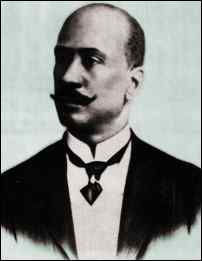
A Brief Look at Martín Morúa Delgado

Martín Morúa Delgado was a friendly rival to Juan Gualberto Gómez in the "Afro-Cuban intelligentsia," putting forth the idea that mulattoes belonged to a new race, distinctly different and "midway" between blacks and whites.
Aline Helg in Our Rightful Share: The Afro-Cuban Struggle for Equality, 1886-1912; "Although he denied establishing a hierarchy among individuals based on the "external accident" of skin color, he nevertheless implied that there was a positive evolution from the full black to the mulatto. If Afro-Cubans continued to refer to themselves as the raza de color, he thought, they would acknowledge the inferior condition that was imposed upon all of them during slavery."
A distinguished writer and orator, Morúa Delgado became a leader in the 19th century anti-slavery movement. He was born in 1856 in Matanzas Cuba, to Ines Delgado and Francisco Morúa. Ines was a native-born African woman brought to Cuba as a slave, and Francisco was an immigrant from Spain.
Since he was forced to leave school at an early age and go to work, Morúa Delgado was a self-taught man, a voracious reader and completely fluent in various foreign languages. He became involved in the island's independence movement which by then included names such as Martí and Maceo, and he believed strongly that Cuba should be an independent nation.
In midst of his work as a labor organizer and essayist for the cause of independence, Morúa Delgado wrote two novels, Sofía and The Unzúazu Family. Both novels dealt with the inhumanity of slavery and its toll on society. He also founded and served as editor of four newspapers; La Revista Popular, La Nueva Era, El Pueblo, and La República.
"In his novels," writes Martha K. Cobb in her bibliographical essay An Appraisal of Latin American Slavery Through Literature (in the Journal of Negro History, Vol. 58, No 4 - Oct. 1973), "Martin Morúa Delgado portrays Cuban urban and rural culture, interpreting its complexity and its many problems as a consequence of slavery, especially the twisted interpersonal relationships which often had a basis in miscegenation and incest."
In May 1910, while serving as President of the Cuban Senate, Morúa Delgado introduced a law that banned political parties based on race or class. The Morúa Law was a direct attack on the Black Independents, and sparked a period of racist isolationism that led to the so-called "Race War of 1912."
Morúa Delgado died the same year, shortly after being named Minister of Agriculture.
Race in Cuba
Opening | Introduction | End of
Slavery | Race Fear |
After the War |
SUGAR |
Race War |
Race War Timeline |
José Miguel
Gómez | Morúa Delgado |
Fernando Ortíz |
Julián Valdés Sierra |
Oriente Province |
Martí on Race |
Bibliography